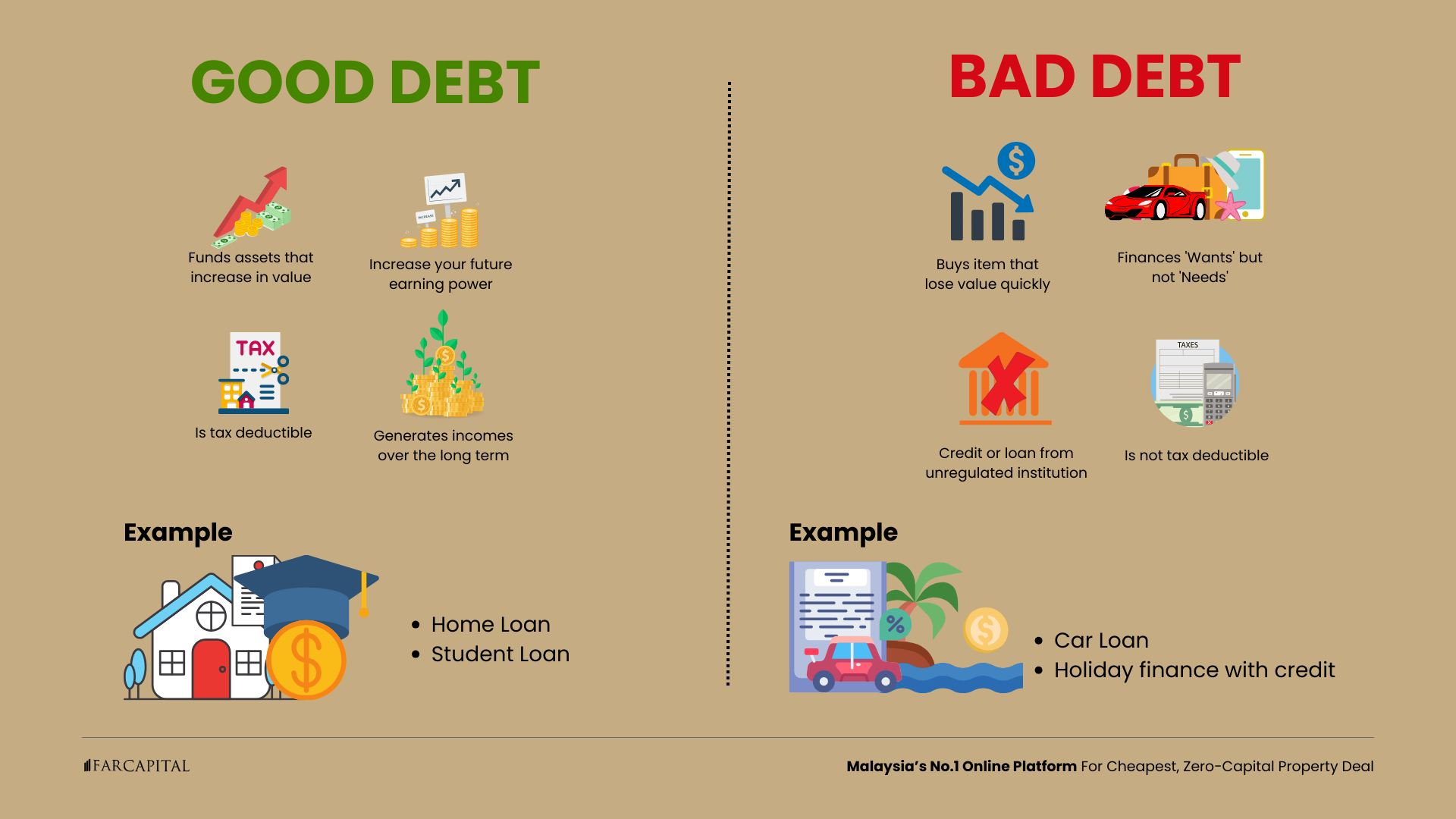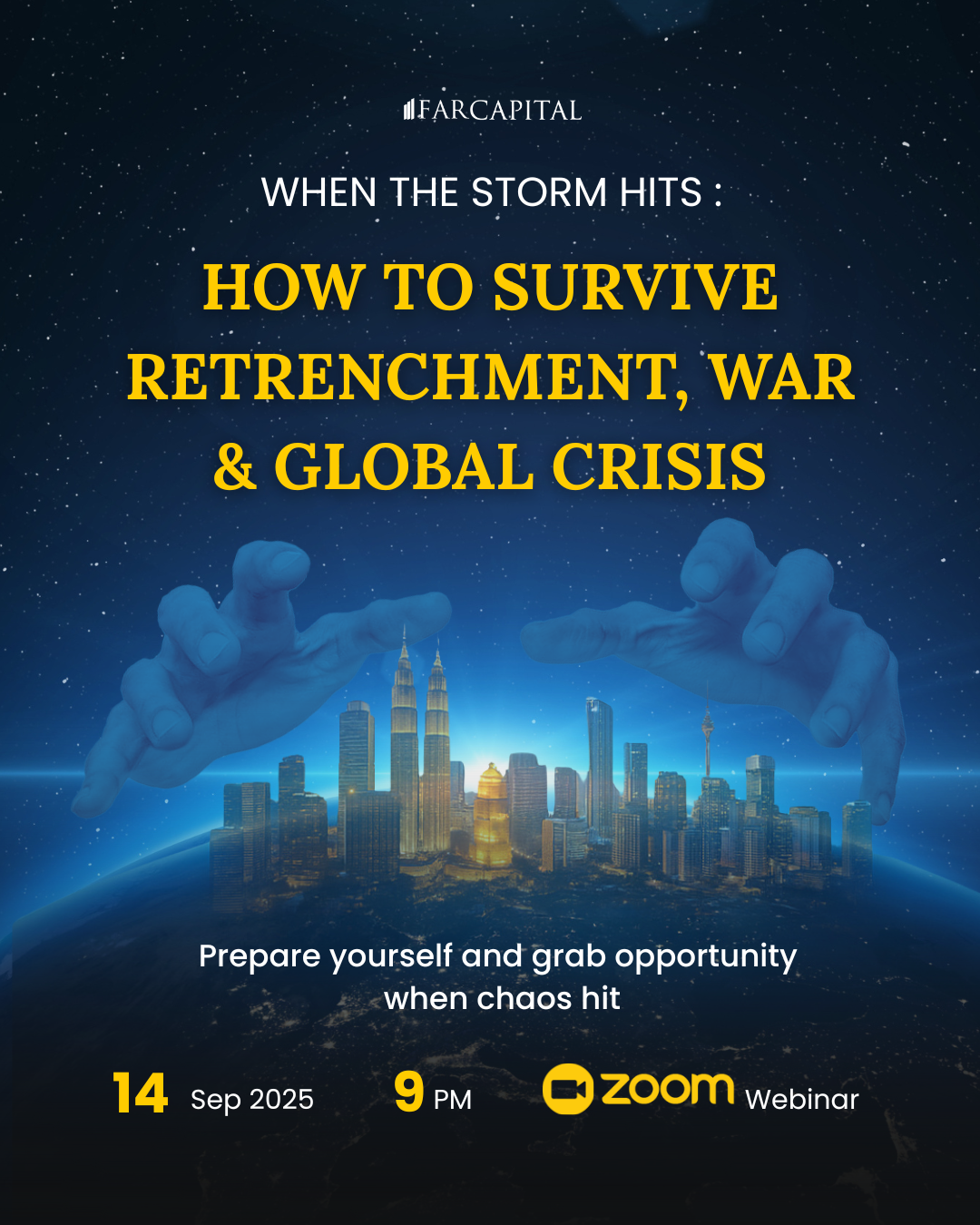Global crises and wars may seem distant, but their shockwaves hit your wallets hard – especially if you’re a Malaysian private sector employee earning RM4k–RM8k. Inflation is pushing the cost of living through the roof, and many companies are retrenching workers to cut costs. The truth is stark: most Malaysians aren’t financially prepared for these […]
Global crises and wars may seem distant, but their shockwaves hit your wallets hard – especially if you’re a Malaysian private sector employee earning RM4k–RM8k. Inflation is pushing the cost of living through the roof, and many companies are retrenching workers to cut costs.
The truth is stark: most Malaysians aren’t financially prepared for these storms.
In fact, 53% of Malaysians don’t have enough savings to last more than 3 months if they lose their job. Many people are spending beyond their means (often due to easy credit cards and personal loans), and as a result, nearly half of Malaysian households are trapped in bad debt from cars, credit cards, and other loans.
Imagine, one retrenchment or economic crisis, you could be in a disaster. Thus, there is no better time as now is the time to take bold action and storm-proof your finances.
This guide will arm you with three practical principles to not just survive, but thrive:
1. Know the difference between good and bad debt
2. Build multiple streams of income (active, leveraged, and passive)
3. Learn how to invest in property with little or no money of your own.
Let’s dive in.
Not all debt is evil. Debt can be a tool or a trap. The key is knowing the difference between good debt and bad debt. Good debt is debt that works for you – it helps increase your net worth or generate income in the long run. Bad debt, on the other hand, drains your wealth – it’s the debt that offers no future value and often comes with high interest costs.

So, if you look at the long-term impact:
Bottom line: Before taking on any loan, ask yourself – Will this debt increase my future earning or net worth? Or is it just financing a lifestyle I can’t afford?
Use debt wisely as a leverage to build wealth (education, a home, a business). And if you already have some bad debts (like credit cards), make it a priority to pay them down fast.
Good debt can be your friend on the road to financial security, but bad debt is quicksand that will sink you when a crisis hits.
Relying on a single salary is like having a one-legged stool – it’s unstable, especially in turbulent times. To survive a global crisis or a layoff, you need to diversify how you earn.
There are 3 types of income you should understand and build: active, leveraged, and passive income. Each works differently, and savvy individuals use a mix of all three to weather economic storms.
.png)
1. Active Income: This is the money you earn by working – your salary, wages, or overtime. It’s called “active” because you must put in time and effort continuously to keep earning. No work, no pay. For most private income earners in Malaysia, this is their main or only source of income.
Active income is straightforward: you trade hours or skills for ringgit. The problem? If that job is threatened (say your company starts layoffs), or you fall sick and can’t work, your active income can vanish overnight. Active income alone is fragile.
2. Leveraged Income: This is money you earn by leveraging other people’s time, skills, or a system. In other words, you set something up once and then earn from it multiple times over, often by having others help drive the income.
It’s like building a machine that makes money even when you’re not personally cranking it every moment. Leveraged income bridges the gap between active and passive – you still put in effort, especially at the start, but your earning isn’t tied 1:1 to your hours.
3. Passive Income: Passive income is often described as “making money while you sleep.” It’s income that requires little to no daily effort to maintain – typically coming from investments or assets that generate revenue on their own.
Common examples are rental income from a property, dividends from stocks, interest from fixed deposits or bonds, or royalties from creative works. The beauty of passive income is that the money keeps coming in when you’re focused on other things or when life knocks you down.
Why do these three types matter?
In a global crisis or war-like scenario, multiple income streams mean resilience.
If your active income (job salary) is reduced or lost, your leveraged and passive incomes are still there to support you. Don’t be content with one leg to stand on – build a stable stool with 3 legs (active, leveraged, passive) so you can stay upright no matter how hard the economic winds blow.
Property can be one of the best hedges in a crisis – it provides rental income (passive) and can appreciate in value over time. Plus, real estate is a good debt investment if done wisely, because you leverage the bank’s money to own a tangible asset. The property should pay you, from day one.
You might be thinking, “Invest in property? With my salary and zero extra cash? Impossible.” It’s a common belief that you need a huge down payment and a lot of cash to get into real estate. But here’s an eye-opener: many Malaysians have figured out ways to buy property with little or no money down, and you can too.
During crises, property values can dip, but if you buy smart (below market or in a high-demand area), you set yourself up for both immediate income and future equity gains.
Remember: using these methods requires financial engineering and discipline. Just because it’s “other people’s money” doesn’t mean it’s free money. Fully financed deals still mean monthly commitments, so ensure you can service the loan (preferably from rental income).
But done wisely, buying property with little of your own money is a smart way to build wealth when inflation is eroding the value of cash savings. It’s literally making your ringgit work harder via leverage. In a crisis scenario of high inflation, holding a real asset can actually protect you. The takeaway is: don’t be afraid of property investment due to lack of cash. Leverage the tools out there.
The world isn’t going to wait for you to feel “ready.” Global crises, wars, pandemics – they tend to strike when least expected, and the time to prepare is now.
If you’ve read this far, you’re already ahead of most of your peers who are hoping things will just “get back to normal.” Hope is not a strategy. Action is.

If you’re ready to take the next step, join us for a special FREE webinar: “WHEN THE STORM HITS: How to Survive Retrenchment, War & Global Crisis.” This live session will dive even deeper into strategies for crisis-proofing your career and finances.
You’ll learn:
• How to build wealth that doesn’t rely on your job?
• Signs of a collapse before it hits your wallet
• How property can be your shield (or your downfall)?
• Financial self-defense strategies no one’s teaching you
Whether you’re worried about being laid off, struggling with expenses, or just want to be ready for whatever the world throws our way, this webinar is for you.
LIMITED SPOTS.
Click here to register.
P/s: See you at the webinar – let’s weather the storm together and come out stronger!